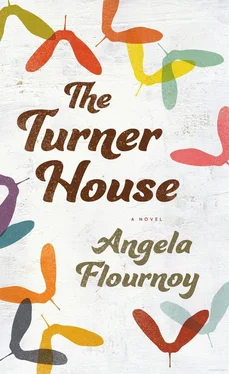Like hand-me-down clothes, the legacy of the haint faded as the years went by. For a few years the haint’s appearance and Cha-Cha’s triumph over it remained an indisputable, evergreen truth. It didn’t matter that no subsequent resident of the big room had a night to rival Cha-Cha’s. None of them ever admitted to hearing so much as a tap on the window during their times there. The original event was so remarkable that it did not require repetition. Cha-Cha took on an elevated status among the first six children; he had landed a punch on a haint and was somehow still breathing. But with each additional child who came along the story lost some of its luster. By the time it reached Lelah, the thirteenth and final Turner child, Francis Turner’s five-word rebuttal, “Ain’t no haints in Detroit,” was more famous within the family than the story behind it. It first gained a place in the Turner lexicon as a way to refute a claim, especially one that very well might be true—a signal of the speaker’s refusal to discuss the matter further. The first six, confident that Francis Turner secretly believed in the haint’s existence, popularized this usage. By Lelah’s youth, the phrase had mutated into an accusation of leg pulling:
“Daddy said if I get an A in Mrs. Paulson’s, he’d let me come on his truckin trip to Oregon.”
“Or-e-gone? Come on, man. Ain’t no haints in Detroit.”
Cha-Cha transported Chryslers throughout the Rust Belt on an eighteen-wheeler. The job was the closest thing to an inheritance that he received from his father. After his twenty-fifth birthday the old man took him to his truck yard, introduced him to the union boss, and ushered him into the world of eighteen-wheelers, all-nighters to Saint Louis, and the constant, cloying smell of diesel fuel. Cha-Cha joked with his brothers who’d joined the service that he was more decorated at Chrysler than all of them combined. This wasn’t a warmly received joke, but it was true. He held records in the company for fewest accidents, best turnaround times, cleanest cab, leadership, and dependability. He did this for over three decades, until, if what he saw was really what he thought he saw, the haint tried to kill him.
Cha-Cha was driving a full load of SUVs to Chicago during a storm. His rig at full capacity was a sight to behold—five-ton gas-guzzlers stacked like toys in two rows behind him. One, supported by a metal overhang, perched right above the roof of Cha-Cha’s cab. He had reached the M-14, just past Ann Arbor, when, according to the police report, a deer darted onto the highway, causing a sedan to swerve into Cha-Cha’s lane. Cha-Cha, in turn, veered off the highway and into a ditch.
“He ran me off the road” was the first thing Cha-Cha said when he woke up in the hospital.
“Who ran you off the road, baby?” his wife, Tina, asked. She put a plaintive hand on his arm cast.
“I knew he’d come back.”
“Who? Come back from where?” Lelah asked.
Cha-Cha put his free hand on the bed, made to sit up and see who else was in the room.
“Just sit still, Cha,” Tina said. “I got the remote right here.”
In the awkward seconds it took for the mechanical bed to raise him, Cha-Cha remembered the night before. He saw the car to the left of him swerve into his lane. And he’d swerved, true enough, but only onto the shoulder. Then blue light, that familiar, flickering, and fear-inducing blue from the big room, filled his cab. He couldn’t see the road to pull back onto it. He remembered clamping onto the wheel then, and hunching his shoulders forward as he tried to make out the road. He couldn’t do it, and just as he conceded this point, he heard a fluttering, similar to the fluttering of the curtains that had roused him from his sleep so many years before. A sound like a multitude of moths, then silence. His old haint had found him and almost destroyed him in a matter of seconds.
His truck dragged along the brush for several hundred feet before slamming against a tree that was big enough to hold its ground. His seat belt did not catch the way it was supposed to in such an accident, and Cha-Cha’s body bounced around the cab—up to the roof first, then hard against the driver’s side door. He broke six ribs, his left arm, his collarbone, and, as if someone somewhere saw fit to initiate him into old age, his left hip.
Once propped up in the hospital bed, Cha-Cha gained a better sense of the owners of the voices in the room. His mother, Viola, stared at him from her wheelchair. Her neck muscles looked tense, as if the strain of supporting her head was getting the best of her, like a newborn baby. He wondered how long she’d waited for him to wake up. It annoyed him that someone, likely his sister Lelah, considering her proximity to Yarrow Street, had put Viola through the trouble of an unnecessary hospital visit. His boys, Chucky and Todd, leaned against the bathroom door. Francey was there, as was Troy, still in his police uniform. And someone else, too. Someone male, and white, and professional-looking, presumably the doctor, by the door.
“You said somebody found you, Cha?” Viola asked. Her voice sounded weak, weaker than the last time he’d heard it.
“The haint, Mama, remember?” Cha-Cha asked. “There was that same blue light from the big room.”
“Cha-Cha, you’ve got a lot of painkillers in you right now,” Francey said. She put her hand on Viola’s shoulder, looked around the room in a way that made Cha-Cha nervous.
“Francey, don’t look at me like I’m crazy. It was that same haint in my cab, I—”
“Dad,” Chucky cut in. “Not. Now.” He and his brother wore the same nervous expression. A half smile usually reserved for police officers—and, Cha-Cha recalled, schoolteachers.
The man in the doorway cleared his throat.
Perhaps it was his over-starched dress shirt, or maybe that he’d displayed patience few doctors could have mustered during the previous exchange, but Cha-Cha realized this man could only be one person. The INSURANCE MAN is here , he thought, and then, Oh, hell.
Milton Crawford was not an unpleasant man, but Cha-Cha quickly decided he had no sense of humor. He was fond of peppering sentences with actually , even if he wasn’t clarifying anything.
“Actually, GM Life and Trust takes its employees’ state of minds before accidents quite seriously,” he said.
“I’m sure they do,” Cha-Cha said, “but what you heard wasn’t me before the accident, it was me after surgery, and sitting here getting this”—he reached unsuccessfully for his drip bag—“put into my bloodstream for a few hours.”
“I do understand that, Mr. Turner, but actually what you just described, a vision of a ghost, has to be included in the report. It may actually amount to nothing, but I’m obligated to transcribe our entire conversation here.”
“But he wasn’t talking to you,” Lelah said. Her hands moved to her hips. “He’s lucky to be alive right now. Can’t you come back tomorrow?”
“Lelah, let Cha-Cha handle this,” Francey said.
“Lelah’s right,” Troy said. “He didn’t even notice you were here. He thought he was speaking in confidence to us. You can’t go holding him accountable for that.” Ever since joining the police force, Troy was quick to become litigious.
Cha-Cha cleared his throat.
“Look, Milton, truth is, I’m tired. If you have to include it in your report, feel free to do so. I’m sure it’ll amount to nothing, like you say.”
Actually, it did amount to something. Three weeks into his Family and Medical Leave Act insurance, a letter arrived from a Mr. Tindale, who claimed to be Milton Crawford’s boss. He said Chrysler would offer Cha-Cha his normal wages for the duration of his recovery, on the condition that he see a company psychologist, who would determine whether he was “personally culpable” for any aspect of the crash. All drivers had to submit to drug testing after an accident, and often a trace amount of alcohol or cocaine (used by the younger guys to help them stay awake) would be the reason they didn’t get the money they thought they deserved. Cha-Cha had never heard of a driver being required to have a psychological evaluation.
Читать дальше












